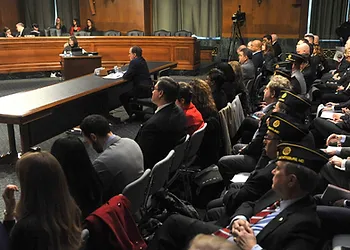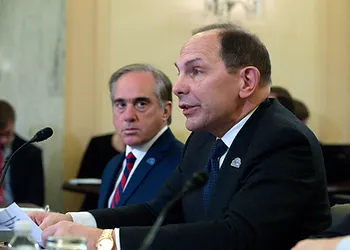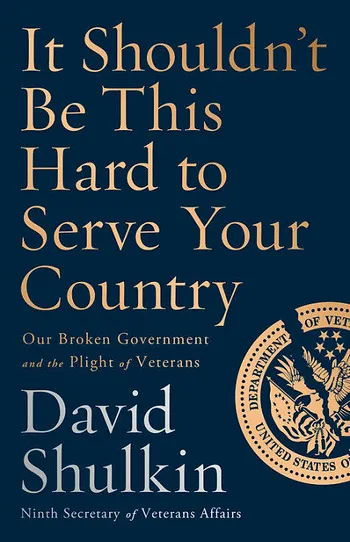On Wednesday, September 27, 2017, VA Secretary David Shulkin, MD., and Dr. David Carroll, Executive Director, VA’s Office of Mental Health and Suicide Prevention testified before the Senate Committee on Veterans’ Affairs on the department’s suicide prevention programs. Testimony followed the signing of a Suicide Prevention Declaration by Secretary Shulkin and leading members of the Senate Committee on Veterans’ Affairs. [VA photo by Robert Turtil]
PART 2 OF VHPI’S CONVERSATION WITH DR. DAVID SHULKIN, THE 9TH SECRETARY OF THE DEPARTMENT OF VETERANS AFFAIRS.
Former VA Secretary Dr. David Shulkin joined VHPI Executive Director Brett W. Copeland and VHPI Senior Policy Analyst Suzanne Gordon for a discussion about his new book It Shouldn’t Be This Hard to Serve your Country: Our Broken Government and the Plight of Veterans. The book presents a detailed account of Shulkin’s interactions with President Donald J. Trump and the ‘politicals’ who dominate his administration. VHPI’s discussion with Dr. Shulkin dives into the implications of The VA MISSION Act of 2018 for the future of veterans’ health care. Shulkin also talks about the political forces – like the Koch brothers and their representatives – who have pushed so hard for VA privatization.
This is part two of a two-part interview. Read part one here. The transcript has been lightly edited for clarity.
Brett W. Copeland, VHPI Executive Director: One of the high-quality areas that [scores highly] over and over is clinical mental health care. But if that care can’t be delivered quickly enough, the MISSION Act consolidated community lanes of eligibility. Do you think it would be disadvantageous to create new lines of eligibility for clinical mental health care like through grant programs like the ones coming through the IMPROVE Well-Being for Veterans’ Act?
Dr. David Shulkin, former VA Secretary: I do think these access standards and the rules around access to care and mental health do deserve additional focused attention because I do believe the systems of care between mental health and physical health have developed so differently.
I think these access standards – again another reason why I wanted them to be pulled out of the law and at the discretion of the secretary – is that…you have to be constantly looking at them, and learning from, and evolving, and changing them. So I think it’s a good idea.
I don’t have enough data objectively to make a determination on the need to be granting all these outside grants to agencies rather than investing internally, but that would be something I’d be very interested in studying. Whether there’s really access problems and where these grants are being allocated and whether they actually follow the data, whether they suggest there is a need in those areas.
I have no doubt that if we’re going to solve or make a big impact on the issues of veteran suicide and other issues, VA isn’t going to be able to do this alone. It’s going to have to work with community organizations.
Copeland: You had to go back to Congress repeatedly to get more Choice funds because it depleted so quickly. Do you see the same kind of risk happening with the Community Care Network? You said its budget was grossly underestimated – $17 billion for Community Care. Can that budget truly be separated from the VA’s budget so that it doesn’t impact VHA care?
Shulkin: I haven’t seen any plan that would separate them and would prevent if there’s a big demand for private sector care as I believe there will be…I haven’t seen any plan that would protect the core assets of VA facilities.
I think that when the MISSION Act was put through, the budget assumptions suggested there would be no shift in resources from the current burn rate. If you go back and look at the Commission on Care that produced its economic estimates in their report that was published in 2015, it was suggested there’d be an up to $50 billion shift in resources toward the private sector.
What the right answer is, I don’t know. I suspect it’s not $0 and it may not be $50 billion, but it may be something in between. That’s why I believe this is so essential to have the monitoring of the impact of these policies so if they start going significantly off where it was assumed to be that adjustments are made in the policies and standards so we don’t find ourselves years down the road going “well it’s too late to go back and fix this.”
Suzanne Gordon, VHPI Senior Policy Analyst: I’m hearing a lot about cost increasing because there’s a lot of things that the VA does that they are now shifting to the private sector. For example, when you send shoulder surgery out to the private sector because the VA can’t do it. The VA could do the cardiac clearance, the pulmonary clearance, the labs, the MRI.
Instead, what’s happening is they’re shifting that to the private sector. So the costs are going up on all kinds of things that could be done at the VA isn’t being done. One medical director I talked to said her budget for Community Care in 2018 was $32 million and her budget for Community Care for the last three months of 2019 is $53 million. That’s a huge increase.
Shulkin: I’m not privy to those numbers, but I think these are the things that you have to watch. If the example is [outsourcing] orthopedic surgery. Is it because VA has decided not to fill the positions? Then if that’s the case, what is the care in the Community and what’s the right thing to do for veterans in that community for shoulder surgery?
I’ve been getting emails from people that were part of the interim staffing program at the VA which I thought was one of the programs was one of the best. When the doctor leaves a VA somewhere, whether on vacation or medical leave or somebody leaves and they can’t fill it right away…VA has this pool of doctors that would travel and fill in so you wouldn’t have to disrupt the service. These doctors have now written to me saying that VA has disbanded that entire group.
Gordon: You’re kidding.
Shulkin: I don’t know why they’ve done that. It doesn’t make a lot of sense to me. I don’t like to guess but…this could be a strategy to say, ‘well look, wherever we don’t have access instead of trying to provide it, we’re just going to shift care to the private sector.’ This may be the death by a lot of paper cuts but without understanding why they’re making these decisions, I don’t mean to be speculative.

Gordon: …It wasn’t an assumption in your book when you first went in you were fighting and ultimately leaving because there’s a commitment on the part of [Darrin] Selnick and CVA to privatize, based on ideology and not clinical need of veterans. What’s the strategy to protect what…you’ve argued is a national jewel?
Shulkin: What I learned by being in Washington is there are many powerful constituencies making VA policy. The Executive Branch is just one of them but fortunately, we have Congress and we have a very organized advocacy group of veterans. In part, represented by the Veteran Service Organizations but also by individual veterans and the American public that cares about them. So I think the role of congressional oversight is extremely important and essential. I think the ability for veterans to speak out for what is best for them is equally important.
If everybody doesn’t do their part in this process, we could end up looking back and saying “boy that was a big mistake that we made.”
Copeland: Do you think that the access standards in lieu of quality standards, and the COVER Commission, are being used as political tools by pro-privatizers to advance that privatization agenda?
Shulkin: I felt that was absolutely the case. Yes.
Gordon: Could you talk to us a little more about the COVER Commission?
Shulkin: I don’t have a lot of details on that… Obviously I support the goal of focusing resources. I was very happy that Sec. Wilkie continued the priority on veterans’ suicide and pulling together people who are concerned about this and developing ideas. I think it’s going to be a good thing. So on the surface, I’m supportive of it, but I’m not aware if they’ve come out with recommendations or proposals.
Gordon: Let me ask you a question about the media which I’ve written a lot about and what you’ve written about. There seems to be an excessive focus from in the media on everything that’s wrong with the VA and almost zero reporting on all the great studies coming out on the VA. How do you see that problem?
Shulkin: I have the perspective of having run private health care institutions. And, as I say, issues and problems in hospitals happen everywhere and those types of problems would often stay in my office as the CEO of a hospital. At the VA, they tend to become front page stories and the subjects of Congressional hearings.
The level of transparency at the VA is at a completely different level than what you see in the private sector. I’d also think…good news doesn’t sell newspapers or create clicks on online stories but bad news does. I think that this is really just something that is a reflection of the environment we are in today.
I did say in my book, I think the media turned out to be in some ways an accelerator or used by the administration by running with unconfirmed allegations by creating the focus on VA on issues that appeared to be scandalous but weren’t central to what veterans want. They want to get help and benefits and the services they need when they need them. And yet all the media attention seems to be focused on anything but those issues.
Copeland: Do you think Is there a culpability in the media relations office inside the VA to not counter those stories more aggressively? Either through advertising or their own public relations strategy?
Shulkin: I had set a path, whether it was wise or not, of being open and accessible to the press and being as transparent as I felt was possible. Sometimes pushing the limits of comfort in doing that such as publishing all of our wait times, opioid prescription rates, publishing our data on quality between us and the private sector, my travel. I doubled down on the openness to the press and transparency and clearly I think the press office at the VA wasn’t necessarily in line with that and started to close down my access and the information that was being given out to the press. I don’t think that is unique to the VA. I think that has been somewhat a strategy throughout many of the agencies in the Trump Administration.
Gordon: Did your access to the press change a lot? Obviously you were under two different positions, but under the Obama Administration, did you feel that you had better access to the press than … under Trump?
Shulkin: It’s a hard one to answer because I was in a very different position. I think the secretary’s office at the VA, the press office reports to the secretary so I would have a hard time comparing the administrations.

I think that the openness and access to the media was philosophically…I was more aligned with the press office under the Obama Administration than I was necessarily with the people in the Trump Administration on that. But…to be fair, this was very much, as I detail in my book, a story of two different timelines when I was secretary. When I first got going, there was a great deal of support for the initiatives I was doing and there was an openness to working with me, including access to the press.
And then when it got to the point that they saw I was not willing to blindly support the policy initiatives that were coming out…The biggest one of those…was related to the access standards and privatization. Then my access to the press and some of the tactics that I detail in the book started to happen.
Copeland: With the number of folks who came into the department from Concerned Veterans for America was there an immediate realization by you that things were going to be different than in the Obama Administration. What was that feeling like?
Shulkin: …Let me start with the Obama Administration. I entered relatively late in the Obama Administration. By the time I got there, CVA – which is that political arm of the Koch Brothers – was not at all welcome into the conversation, wasn’t part of the conversation, so felt very alienated by being outside of any discussion.
When the Trump Administration came in, they clearly wanted to see that changed. I felt that having people with different opinions and different views was always a good thing to do. So I allowed them a seat at the table, not all the tables, but I certainly wanted to make sure they had an opportunity to be heard.
Whenever I went over to White House events they were always there so frankly it didn’t make any sense not to have a relationship with them. In the end, I‘m not sure that was a good strategy.
They tended to be not ones that listened or compromised. They seemed extremely focused on their particular solution and in a sort of ‘win all, lose all’ position rather than one wanting to contribute to a solution.
Gordon: How would you have, in retrospect, dealt with them differently?
Shulkin: I think that I probably would have, in retrospect, been much clearer about the ground rules in which sort of the behaviors and the principles on how I expected people that were going to have a productive seat at the table to behave and to work with others. I probably should have spent more time thinking about what was happening when people weren’t in front of me. Because, clearly there were many activities happening at many levels throughout government.
I don’t think it’s the right thing to exclude people with different ideas. I’m firmly committed to that in democracy, the best way to get to the best solution is by hearing from everybody. But I think everybody has to be willing to be upfront and play by the same rules if you are going to participate in policy making.
Dr. Shulkin’s book, It Shouldn’t Be This Hard to Serve Your Country: Our Broken Government and the Plight of Veterans, is available now from Public Affairs Books.

Copeland: In the last chapter of your book, you talk about how the culture needs to change in washington to attract good people. Do you think that’s ultimately possible?
Shulkin: I do. I’m eternally optimistic. I believe that we see changes in the values system and the belief system in our culture all the time. One of the reasons I wrote this book was to try and let people see what this environment is like and the impact it has on individuals who choose to go into public service.
If we don’t look in the mirror and change the way that this environment is…good people who can help and that we’ve always expected to help improve government services, as well as really dedicated career people, are not going to want to be part of public service. That’s going to have a negative impact on all of us.
I’m seeing a brain drain of career people who are putting in their retirement papers and I’m seeing people really question from the private sector whether they’d be willing to enter an environment like this. That, frankly, makes me very sad.
We desperately need those people. The problems in society aren’t going away. We need the best and the brightest of our country be willing to come and contribute to those solutions.




